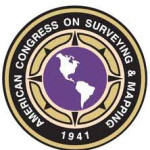- Industrie: Earth science
- Number of terms: 93452
- Number of blossaries: 0
- Company Profile:
Founded in 1941, the American Congress on Surveying and Mapping (ACSM) is an international association representing the interests of professionals in surveying, mapping and communicating spatial data relating to the Earth's surface. Today, ACSM's members include more than 7,000 surveyors, ...
In an inviscid fluid in steady motion, v²/2 + p/D + gz = constant, where v is the rate of flow, p the pressure, D the density, z the depth and g the acceleration of gravity. It is equivalent to saying that the sum of the per mass kinetic energy plus the external pressure plus the gravitational pressure is constant everywhere in the fluid.
Industry:Earth science
All characters used by an electronic computer, including letters, numerals, punctuation marks, and such symbols as @, #, $ and %.
Industry:Earth science
A gravity correction gaθ²/2 applied to the value ga of gravity measured by a horizontally accelerated gravimeter to obtain the value of gravity that would have been measured by a stationary gravimeter. θ is the angle through which the axis of the gravimeter is deflected from the vertical. The measured value is in error because the vehicle's horizontal acceleration causes the sensitive axis of the gravimeter to make, on the average, an angle θ with the vertical.
Industry:Earth science
The problem of relating the shape or an inhomogeneous, rotating body in hydrostatic equilibrium to the distribution of density in the body.
Industry:Earth science
A clock in which the intervals of time are determined by reference to the frequencies radiated or absorbed by rotating molecules. The first clock of this kind was the ammonia clock, using the molecules of gaseous ammonia to provide the basic frequency. Radio waves generated in an attached circuit were fed into the gas and the frequency of the circuit adjusted until meters showed maximal absorption of the waves by the gas; this was the desired frequency of resonance. A more recently developed clock uses methane as the gas but the basic principles are the same. Molecular clocks are frequently referred to as atomic clocks but this usage is erroneous. They are also called masers if their principal output is frequency, not time.
Industry:Earth science
Calculation in which each quantity used is represented by two numbers: a coefficient and an exponent (e.g. 3. 9528 2 and 1. 01101 3); the rules of arithmetic are applied separately to coefficient and exponent. Quantities are added or subtracted by first multiplying the coefficients by suitable powers of 10 to make the exponents the same and then doing the calculations on the coefficients. Quantities are multiplied or divided by multiplying or dividing the coefficients and at the same time adding or subtracting their exponents.
Industry:Earth science
Isostatic compensation occurring within a large region.
Industry:Earth science
An approximation to the geoid, prepared by Study Group Number 10 (International Association of Geodesy) under Bomford and presented at the meeting of 1963 in Berkeley, California. It is based on triangulation and astro geodetic data on Europe and adjoining regions, with the backbone extending from Scotland through Switzerland and Italy to Turkey and Iran, and thence to Malaya. It was adopted as the geoid to be used in calculating the European triangulation.
Industry:Earth science
The coefficient of a term in a series of harmonic functions.
Industry:Earth science
The problem of finding the average length of that segment, of a straight line laid at random on a rectangle of specified dimensions, which is contained within the rectangle. Alternatively, the average distance between two points placed at random on different sides of a rectangle of specified dimensions.
Industry:Earth science
